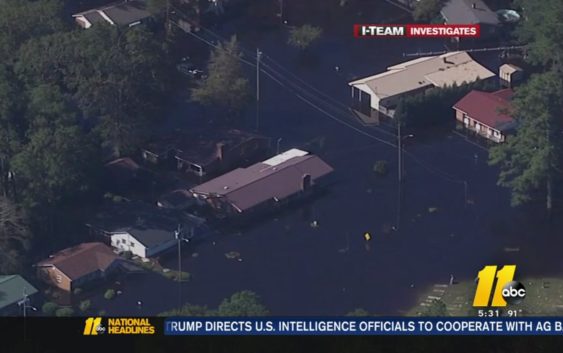- Fake job seekers are flooding the market, thanks to AI
- One set of evacuation orders lifted in Caldwell County after wildfire contained
- 'We gutted every building' | Chimney Rock rebuilding after Hurricane Helene
- 'We gutted every building' | Chimney Rock rebuilding after Hurricane Helene
- Debris from Hurricane Helene provides fuel, complicates containment for spring wildfires
Some I-95 repairs done, but not enough to limit flooding during next hurricane

“It’s unacceptable for people to have to go around our state in order to get to where they’re going.” Cooper said during a visit to Capitol Hill in 2018. “We need to be more resilient, we need to repair these roads in a way they lessen the impact of future storms.”
More than six months after that trip to Washington, the North Carolina Department of Transportation tells the I-Team they’ve made several repairs to thousands of roadways–including Interstate 95 and Interstate 40–but it could be several years before any of those highways get any long term fixes like elevation and flood barriers.
“You have to plan, you have to do environmental studies,” NCDOT spokesman Steve Abbot explains to ABC11. “You can’t just put roads in, especially when you have rivers involved and so forth. And you have to have millions and millions of dollars.”
Much of that money could come from the federal government, but a major $19.1 billion disaster relief bill remains on hold because of Republican challenges.
According to the NCDOT, some of the short term improvements on I-95 include wider pipes and drains, plus new cameras and sensors to make sure no one is caught off guard by flooding.
“If people are evacuating, maybe they don’t wait,” Abbot said. “They evacuate early because in another two days 95 could be under water.”
Lavonne Hudson, who lives in the small town of Falcon in Cumberland County, said flooding on I-95 severely affects his neighborhood.
“We count of 95 for a lifeline and we couldn’t get to anything,” Hudson laments about Hurricane Florence. “We formed a help group and went door-to-door to help the elderly.”
Hudson said he’s already preparing for the next hurricane, and he wants Governor Cooper to keep up the fight to make North Carolina more resilient to hurricanes.
“There’s a lot of people that count on you governor, so get this squared away, please. We appreciate it.”
Copyright © 2019 WTVD-TV. All Rights Reserved.